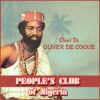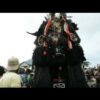Music
Mike Ejeagha, The Living Legend of Igbo Highlife Music
When you speak of icons who preserved and promoted Igbo culture through music and storytelling, one name stands tall — Mike Ejeagha. Fondly called Gentleman Mike Ejeagha, he is more than a highlife musician; he is a cultural historian, philosopher, and a custodian of the Igbo language whose music continues to echo across generations.

Born in 1932 in Enugu, Eastern Nigeria, Mike Ejeagha’s musical journey began in the early 1950s. He quickly carved out a unique style that set him apart from other highlife artists of his time. With a voice full of wisdom and a guitar that spoke as much as he did, he blended music with folklore, creating what many today call “musical storytelling.”
What made Mike Ejeagha’s music extraordinary wasn’t just the rhythm or the melody — it was the deep proverbs, idioms, and parables laced into every line. He used music to teach, correct, and inspire. His songs, often performed in the Igbo language, are like folk tales passed from village elders to younger generations. Each one carries lessons on morality, patience, wisdom, family, and the consequences of greed or dishonesty.
Unlike many musicians who sought fame, Mike Ejeagha chose a quieter path, one rooted in cultural preservation. Over the years, he recorded hundreds of songs, including classics like Omekagu, Ukwu n’aka, Akuko n’egwu, and Enyi Ga Achi. His style, often slow-paced with clear pronunciation and minimal instrumentation, was deliberate: he wanted listeners to hear every word and understand the message.
Beyond performance, Ejeagha played a major role in documenting and preserving Igbo oral tradition. He worked closely with broadcasters and cultural researchers, and his songs have been used in educational programs, radio drama, and academic studies. His lyrics are referenced in schools and cultural studies as examples of indigenous knowledge and philosophy.
In 2024, one of Mike Ejeagha’s classic songs resurfaced and went viral, thanks to popular Nigerian comedian Brain Jotter. The song, with its catchy hook “Gwon gwon gwon gwo”, sparked a trend across social media, especially on TikTok and Instagram. The chant, used humorously in Brain Jotter’s skits, resonated with millions of young Nigerians and brought Ejeagha’s music back into the spotlight.
What started as a social media joke quickly evolved into a revival of appreciation for the legend’s music. Young people began exploring his discography, quoting his proverbs, and using his songs in their own videos. The virality wasn’t just entertainment—it was a digital resurrection of cultural heritage. It proved that Ejeagha’s music still holds weight, even in an age of trending sounds and short attention spans.
Despite age and health challenges in recent years, Mike Ejeagha remains a respected figure in Nigerian music and cultural circles. He is celebrated not just as a musician, but as a national treasure, a man who gave voice to the wisdom of the Igbo people and ensured it wasn’t lost to modernization or western influence.
Mike Ejeagha’s legacy is timeless. His music reminds us that entertainment can also educate, that culture must be preserved, and that language is the soul of a people. In every song he sang, in every proverb he shared, and in every guitar string he plucked, he told the story of a people — the Igbo story.
















